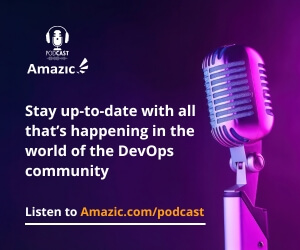AI has dominated the news headlines for the past year and is becoming part of our lives more with every day. In solving complex problems, AI models make us smarter and more efficient. Its impact has extended to DevOps, with developers applying AI/ML models to enhance software development processes and ship quality products faster. With DevOps becoming more and more developer-centric, the number of tools and solutions that have burst onto the scene is unreal.
These AI platforms aim to improve developer experience, and we have realized that applying AI helps achieve that goal faster. This is reflected in MarketResearch.biz’s research, where the GenAI in the DevOps Market is predicted to hit over $22.1 billion by 2032, with a steady growth rate of 38.2% from 2023 to 2032. In 2022, it stood at $942.5 million.
AI and DevOps are powerful in weeding out code vulnerabilities, monitoring workloads and infrastructure, and recommending best practices to streamline the development pipeline.
This article will specifically discuss how AI monitoring tools can help improve application quality by generating actionable insights on demand.
AI in DevOps
AI and DevOps are natural partners as they mandate automation and intelligent processes for operational excellence. AI redefines the software development workflow by enhancing the writing, testing, and optimizing code, monitoring the application and development ecosystem, and managing the development lifecycle. Developers see multiple advantages of enhancing their software practices with AI, including efficiency, accuracy, and reliability. Some of the use cases of AI in DevOps are given below.
- Ease of gathering information at every software development stage
- Enhancing developer productivity through effective software testing
- Better security through advanced security checks in place
- Harmonization of data from multiple sources for effective data analysis
Continuous monitoring with AI-infused tools
Customer experience sits at the heart of a successful application and, by extension, organization. To ensure consistent software performance, you must address any code or infrastructure vulnerabilities before these bugs affect the application. Continuous monitoring can help development teams assume a proactive stance against quality issues. Intelligent monitoring tools can provide a comprehensive view of system and application performance in real-time. It allows the teams to detect and fix problems quickly.
Although most of the solutions provide automation capabilities, the current complexity of the software development process requires AI augmentation. Below are some of the ways they help with consistent monitoring.
Detecting anomalies in the CI phase
AI monitoring tools generate a detailed report of detected anomalies. They thoroughly analyze historical data and draw patterns to flag irregularities. Developers can review these anomalies before moving on to the next development phase. IBM Watson Anomaly Detection is one of the leading solutions that enable developers to generate performance trends.
Assuring the quality of code
Being proactive is an essential aspect of effective monitoring in DevOps. With AI monitoring tools, you can diagnose your code while still developing. AI-based tools like DeepCode can inspect code and raise alerts in case of bugs and vulnerabilities. They also recommend changes that are required to improve code quality.
Use of predictive analytics
Monitoring tools can leverage AI models to churn past data and create scenarios that help predict potential issues. Your development team can use these reports to fix problems that could arise in the future. Using tools like Splunk that build predictive models allows you to solve performance issues preemptively and avoid downtime or outages.
Automate rollbacks during suspicious deployments
During continuous deployment, the monitoring tools must be flexible to call back changes that trigger irregularities or performance issues. Solutions like Harness uses AI models to automate rollback when deployments identify anomalies in application performance. It will revert the application to the latest stable stage.
Improved resource optimization
Monitoring tools like Cast.ai allow you to optimize your infrastructure by evaluating how cloud resources are being used. They look for over- or under-usage of resources, which ultimately helps you reduce cloud costs while optimizing software performance.
Minimal false positives in incident management
Although your basic monitoring tools can identify incidents, they produce many false positives. It will waste your development resources and time. You can avoid this with an AI-based monitoring tool that automates the end-to-end incident management workflow by harmonizing data from multiple sources, analyzing alerts issued from multiple sources, and cleaning out the false positives to expedite incident resolution.
Cognitive analysis of logs
Every development team maintains meticulous logs, yet there will be issues that are not visible to the bare eye. You might need AI capabilities to analyze the logs and draw patterns that give you cognitive insights into your data.
Detecting security threats in real-time
Monitoring tools like Darktrace use AI/ML models to study your application data and detect real-time irregularities. This proactive posture against security threats empowers you to fix these risks and terminate the threat before it can cause damage.
DevOps is evolving, with AI leading the change
Developers have relied on the shift-left strategy to build a risk-averse and quality application using DevOps software development practice. However, application complexity grows exponentially as organizations race for better customer experience. In such a dynamic scenario, the development team must integrate AI for a continuous monitoring approach to ensure consistent application performance. With AI, a majority of organizations hesitate due to the lack of skills gap, implementation cost, and resistance from the team. However, these fears are unwarranted because adding AI into your development process requires monitoring tools that use AI/ML models to assure code quality, detect anomalies, generate predictive analytics, and write optimized test cases.
AI can transform your DevOps practice; however, it will warrant thorough research into monitoring tools’ capabilities and availability.



